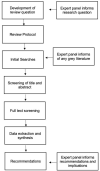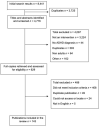A systematic review of interventions to support adults with ADHD at work-Implications from the paucity of context-specific research for theory and practice
- PMID: 36072032
- PMCID: PMC9443814
- DOI: 10.3389/fpsyg.2022.893469
A systematic review of interventions to support adults with ADHD at work-Implications from the paucity of context-specific research for theory and practice
Abstract
Attention Deficit Hyperactivity Disorder (ADHD) is estimated to affect 3.5% of the global workforce. Despite the high prevalence rate, little is known about how best to support adults with ADHD (ADHDers) at work. Relevant research is dispersed across different disciplines such as medicine, health studies and psychology. Therefore, it is important to synthesize interventions aimed at ADHDers to examine what learning can be gleaned for effective workplace support. We conducted a systematic review of relevant interventions framed by realist evaluation and the Context-Intervention-Mechanism-Outcome classification to identify key mechanisms of effectiveness for workplace interventions. We searched 10 databases including a range of journals from medical science to business management applying predetermined inclusion criteria and quality appraisal through a risk of bias assessment for quantitative and qualitative methods. We synthesized 143 studies with realist evaluation. Most studies evaluated the effectiveness of pharmacological interventions highlighting the dominance of the medical approach to supporting ADHDers. Key mechanisms of effectiveness were identified from psychosocial interventions including group therapy, involvement of people in the ADHDers network, and the importance of the client-patient relationship. Overall, there is limited research that examines the effectiveness of workplace interventions for ADHDers. Furthermore, much of the existing research evaluates pharmacological interventions which is difficult to transfer to the workplace context. It is recommended that future research and practice consider the key mechanisms identified in this review when designing interventions as well as barriers to accessing support such as disclosure and self-awareness.
Keywords: ADHD; attention deficit hyperactivity disorder; interventions; systematic review; treatment; work; workplace.
Copyright © 2022 Lauder, McDowall and Tenenbaum.
Conflict of interest statement
The authors declare that the research was conducted in the absence of any commercial or financial relationships that could be construed as a potential conflict of interest.
Figures
References
-
- American Psychiatric Association (2013). Diagnostic and Statistical Manual of Mental Disorders, 5th Edn. Washington, DC.
Publication types
LinkOut - more resources
Full Text Sources





